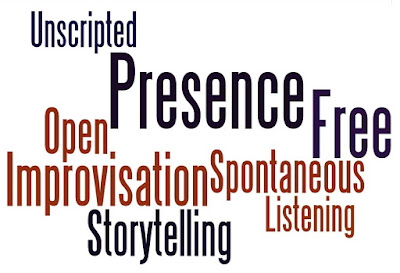Improvisation, Storytelling and Holy Presence: Worship Words and Young People
I spent this weekend as the "worship resource leader" at a retreat for around 130 middle schoolers. My duities included curating worship experiences, preaching, spending time with youth, and facilitating a discussion session on the "holy habit" of worship. To be honest, I felt way underprepared going into this part of the weekend. Given my experience with middle schoolers in youth ministry, I was assuming that youth of this age group were not going to be too keen on having a "disccusion" about worship. They'd prefer, I thought, to actually participate in worship. With this in mind, the majority of my time was spent helping the small groups of young people with whom I was working to plan an aspect of the Sunday mornign worship experience and that took up the majority of our time.
However, as I listened to these groups of young people speak about "what worship means to you," I was stunned at the words they were using. One particular exercise asked them to sit in a circle and each person share one "non-church word" that they believed best described what it means to worship. The image above is a "Wordle" word cloud (you can make on here: http://www.wordle.net/) of the top eight words actually used by 6th - 8th graders to describe "the essence" of what worship is all about. The words are fascinating to me for a number of reasons but the biggest is that most of these youth are coming from very "traditional" churches in which words like "improvisation" and "spontaneous" are not likely to show up on a short list of "worship virtues."
Another part of this discussion that was surprising to me was that as much as these young people talked about the "presence of God" they spoke just as much (if not more) about our being present with one another. The word "conversation" and even the word "mutuality" even came up (granted, mutuality was mentioned by a 9th grader...but still). What this means to me is that the way young people understand worship involves openness to God and to each other. It also involves participation!
Young people this weekend constantly bemoaned being "spectators" in worship and, of course words like "boring" and "stuffy" were used to describe their worship services at home. But the more telling responses came when I asked the question "use one word to describe your community's perspective on your participation in worship?" Here are the words they used:
Of course, this is a small sampling and a very unscientific survey. Nevertheless, it does make me wonder why - in a time when churches are incredibly anxious about the absense of young people from the pews - churches apparently still refuse to provide young people with meaningful ways to participate in their lives of worship. It's a compelling question and one which I am beginning to think deserves more careful research and reflection.
Have you experienced this sort of reflection in younger youth? What about your young people's attitudes about participation in worship? I'd love to hear your comments!
However, as I listened to these groups of young people speak about "what worship means to you," I was stunned at the words they were using. One particular exercise asked them to sit in a circle and each person share one "non-church word" that they believed best described what it means to worship. The image above is a "Wordle" word cloud (you can make on here: http://www.wordle.net/) of the top eight words actually used by 6th - 8th graders to describe "the essence" of what worship is all about. The words are fascinating to me for a number of reasons but the biggest is that most of these youth are coming from very "traditional" churches in which words like "improvisation" and "spontaneous" are not likely to show up on a short list of "worship virtues."
Another part of this discussion that was surprising to me was that as much as these young people talked about the "presence of God" they spoke just as much (if not more) about our being present with one another. The word "conversation" and even the word "mutuality" even came up (granted, mutuality was mentioned by a 9th grader...but still). What this means to me is that the way young people understand worship involves openness to God and to each other. It also involves participation!
Young people this weekend constantly bemoaned being "spectators" in worship and, of course words like "boring" and "stuffy" were used to describe their worship services at home. But the more telling responses came when I asked the question "use one word to describe your community's perspective on your participation in worship?" Here are the words they used:
- Excluded
- Not welcomed
- Banned
- Afraid
- Non-existant
- Yeah right!
Of course, this is a small sampling and a very unscientific survey. Nevertheless, it does make me wonder why - in a time when churches are incredibly anxious about the absense of young people from the pews - churches apparently still refuse to provide young people with meaningful ways to participate in their lives of worship. It's a compelling question and one which I am beginning to think deserves more careful research and reflection.
Have you experienced this sort of reflection in younger youth? What about your young people's attitudes about participation in worship? I'd love to hear your comments!

Comments
Post a Comment